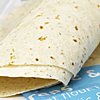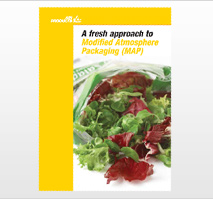Bakery Products

Food items: Bagels, Bread Puddings, Breads, Buns, Cheesecakes, Crépes, Croissants, Crumpets, Danish Pastries, Fruit Breads, Fruit Cakes, Fruit Pies, Fruit Strudels, Fruit Tarts, Meringue Cakes, Muffins, Nan Bread, Nut Breads, Pancakes, Par-Baked Breads, Pitta Bread, Pizza Bases, Pretzels, Sponge Layer Cakes, Swiss Rolls, Taco Shells, Tortillas, Vegetable Breads, Waffles, other items
Recommended gas mix
The gases and mixtures listed above are for general guidance. To identify the optimum gas for your product and process, we recommend you undertake a product trial, with the help of an Air Products MAP gas specialist. If you would like a specialist to contact you to discuss this more click here. Storage temperature Achievable shelf-life Principle spoilage organisms and mechanics Food poisoning hazards include |
Typical MAP machines Typical types of package Examples of typical MAP materials Lidding and/or pillow
pack film: Bulk |
 The principal spoilage mechanisms for non-dairy bakery
products are mould growth, staling, and moisture
migration. Yeasts may cause a problem in certain filled
or iced products. Since the a w of non-dairy bakery
products is generally less than 0.96, bacterial growth is
inhibited and rarely a problem. However, it is possible
that Staphylococcus aureus and Bacillus species may be
able to grow in certain products and hence pose a
potential food poisoning hazard. Consequently, good
hygiene and handling practices must be observed
throughout.
The principal spoilage mechanisms for non-dairy bakery
products are mould growth, staling, and moisture
migration. Yeasts may cause a problem in certain filled
or iced products. Since the a w of non-dairy bakery
products is generally less than 0.96, bacterial growth is
inhibited and rarely a problem. However, it is possible
that Staphylococcus aureus and Bacillus species may be
able to grow in certain products and hence pose a
potential food poisoning hazard. Consequently, good
hygiene and handling practices must be observed
throughout.
The use of MAP can significantly extend the shelf-lives of non-dairy bakery products. Since moulds are aerobic micro-organisms, they are very effectively inhibited by CO2/N2 gas mixtures. A gas/product ratio of 2:1 is often used. Moisture migration from the pack is prevented by using barrier materials for MAP. MAP appears to have little effect on the rate of staling. It should be noted that staling rates are increased at chilled temperatures and hence most cold-eating bakery products are normally stored at ambient temperatures. For hot-eating bakery products, such as pizza bases, the staling process, which is caused by starch retrogradation, is partially reversed during the reheating cycle.



